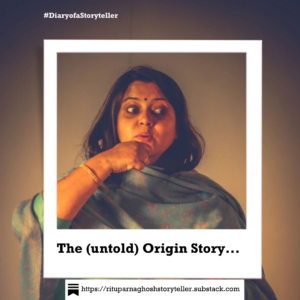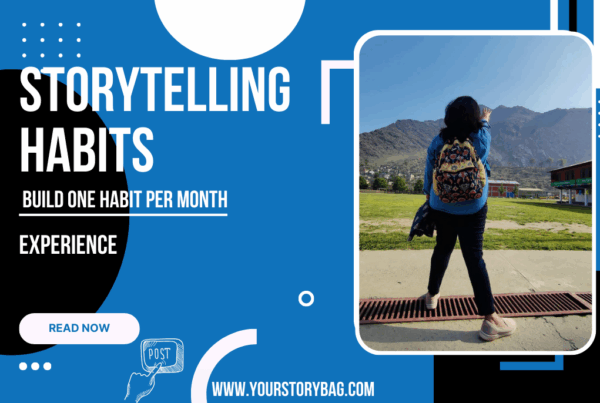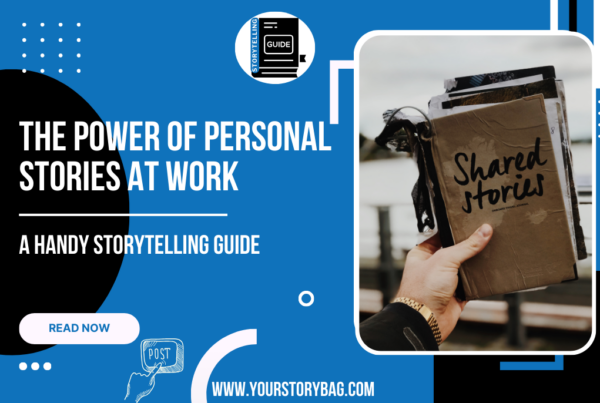The MOTH Radio Hour is one of my most favourite storytelling podcasts. I listen and sometimes re-listen to at least ONE episode every week. To be honest, I have been feverishly following The Moth since 2012. I love their mission. They work. Their contribution towards making storytelling aspirational, accessible and accepted.
A few weeks back, during my morning drive and later evening walk, I finished an incredible episode on Second Act.

The Moth Radio Hour is available as a Podcast.
The episode and its stories reminded me of a particular #365Days365Stories Prompt:
“Describe a significant milestone story that changed the course of your life story.”
This prompt was written to enable people to find their ‘second act stories’. We all have at least ONE pivotal story in our lives, even if it has brought on a minor shift in our mindset, our work, or our relationship with people or work.
These stories of transformation could be seen as the ‘coming of age moment’, or a turning point, or a juncture that defines the division between ‘before’ and ‘after’.

The prequel to my ‘Second Act’
Last week on my personal Substack, I wrote the origin story of how I became a Performance / Oral Storyteller from being a Television Journalist. You can read Begin Here as the story that prompted my second act.
So what is Second Act and how do you identify, craft and tell your story.
I decided to dedicate this month’s Storytelling Vocabulary to talking more about Second Act.
Second Act, is a borrowed term from theatre. It refers to a singular event that acts as a pivot in an individual’s transformation, reinvention, departure from the old towards the new and a pursuit of new aspirations. This stage could signify a bold leap into the unknown, often fuelled by the desire for growth, fulfilment and a renewed sense of purpose.
Second Act, could arise as a response to a situation or a phase of life. For example, it could be anchored around a certain life stage, a career shift, an unexpected gain or loss, mid-life crises and more. This period is marked by introspection, resilience, and the courage to embrace new challenges.
Here are some examples of Second Act Stories:
Career Reinvention – One of the most common manifestations of a “Second Act” is a career change. Imagine the story of a successful corporate executive who, after years of climbing the corporate ladder, decides to pursue a passion for teaching. This transition from the corporate world to education not only fulfills a long-held dream but also brings a fresh sense of purpose and joy.
Personal Growth – Personal Growth stories spring after periods of low, stagnation or lack of purpose. It could coincide with a time when you shifted the perspective on yourself and learnt a new skill, got out of your comfort zone and adopted something new. Imagine the story of a mother who returns to the workforce or starts a new business after her children leave home. Perhaps she picked up a new skill and made a career out of it? This story of reinvention shows personal growth.
Events Story – Events in a person’s life can be a milestone that changed the course towards something remarkable. Or it be an incident that brought trauma and suffering. Remarkable Second Act stories have emerged out of despair. Imagine an accident, or a personal loss. Or think of a shift of geography, a chance encounter with something or someone.
Why are Second Act Stories important?
Stories of “Second Acts” resonate deeply because they embody the human capacity for change, resilience, and the pursuit of meaning. These narratives hold significance in both professional and personal contexts, offering valuable lessons and inspiration. Learning to identify, craft and tell these stories can help you at significant moments in your life.
From the Professional Lens:
- Innovation and Creativity: Individuals who undergo “Second Acts” often bring fresh perspectives and innovative ideas to their new endeavors. Their diverse experiences can lead to creative solutions and approaches that benefit their professional pursuits. For example, a former nurse who becomes a healthcare consultant can offer unique insights that bridge practical experience with strategic planning.
- Leadership and Mentorship: People who have successfully navigated their “Second Acts” can become effective leaders and mentors. Their stories of resilience and transformation can inspire and guide others facing similar transitions. In a corporate setting, a manager who has shifted careers can mentor employees, offering valuable advice on adapting to change and pursuing passions.
- Adaptability and Resilience: The ability to adapt and thrive in new environments is a key takeaway from “Second Act” stories. Professionals who have undergone significant changes are often more resilient and better equipped to handle future challenges. This adaptability is a valuable trait in dynamic and rapidly evolving industries.
On Personal Grounds:
- Fulfilment and Happiness: On a personal level, “Second Acts” often lead to increased fulfilment and happiness. Pursuing passions and embracing new challenges can reignite a sense of purpose and joy.
- Personal Growth and Development: The journey through a “Second Act” is often marked by significant personal growth. Overcoming obstacles, learning new skills, and stepping out of one’s comfort zone contribute to a deeper understanding of oneself. This personal development can enhance relationships, self-esteem, and overall well-being.
- Seeding Hope: Sharing “Second Act” stories can inspire others to embrace change and pursue their own transformations. These narratives offer hope and encouragement, demonstrating that it is never too late to redefine oneself and pursue new dreams.
Feeling inspired?
Here are some prompts to help you craft your Second Act Stories:
Craft your Second Act Career Story:
“Have you changed your career path? What were the circumstances that led to your change in career? How did the decision eventually impact your life?”
Craft your Second Act Personal Growth Story:
“What made you pick up (your new skill)? When did you make it your new mission in life?”
Craft your Second Act Events Story:
“Can you describe yourself Before and After the moment (describe the event)?”
This is the first time I am writing an accompanying post for our Instagram Series – Storytelling Vocabulary.
Tell us if you enjoyed reading this.






